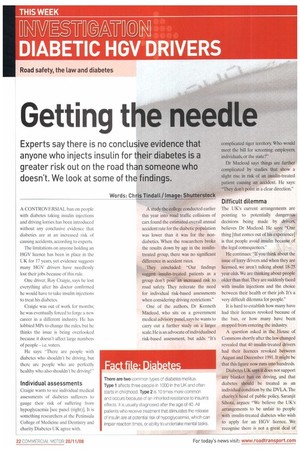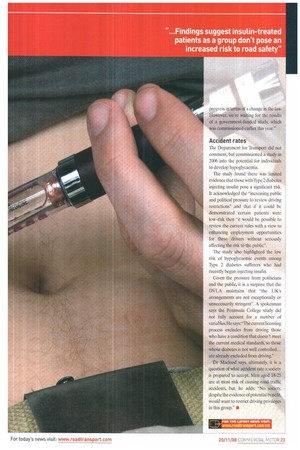Getting the needle
Page 22

Page 23

If you've noticed an error in this article please click here to report it so we can fix it.
Experts say there is no conclusive evidence that anyone who injects insulin for their diabetes is a greater risk out on the road than someone who doesn't. We look at some of the findings.
Words: Chris Tindall/Image: Shutterstock
A CONTROVERSIAL ban on people with diabetes taking insulin injections and driving lorries has been introduced without any conclusive evidence that diabetics are at an increased risk of causing accidents, according to experts.
The limitations on anyone holding an HGV licence has been in place in the UK for 17 years, yet evidence suggests many HGV drivers have needlessly lost their jobs because of this rule.
One driver, Roy Craigie, says he lost everything after his doctor confirmed he would have to take insulin injections to treat his diabetes.
Craigie was out of work for months; he was eventually forced to forge a new career in a different industry. He has lobbied MPs to change the rules, but he thinks the issue is being overlooked because it doesn't affect large numbers of people — i.e. voters.
He says: -There are people with diabetes who shouldn't be driving, but there are people who are perfectly healthy who also shouldn't be driving!"
Individual assessments
Craigie wants to see individual medical assessments of diabetes sufferers to gauge their risk of suffering from hypoglycaemia [see panel (right)]. It is something researchers at the Peninsula College of Medicine and Dentistry and charity Diabetes UK agree with. A study the college conducted earlier this year into road traffic collisions of cars found the estimated overall annual accident rate for the diabetic population was lower than it was for the nondiabetics. When the researchers broke the results down by age in the insulintreated group, there was no significant difference in accident rates.
They concluded: "Our findings suggest insulin-treated patients as a group don't pose an increased risk to road safety. They reiterate the need for individual risk-based assessments when considering driving restrictions."
One of the authors, Dr Kenneth Macleod, who sits on a government medical advisory pa.nel,says he wants to carry out a further study on a larger scale. He is an advocate of individualised risk-based assessment, but adds: "It's complicated tiger territory. Who would meet the bill for screening: employers, individuals, or the state?"
Dr Macleod says things are further complicated by studies that show a slight rise in risk of an insulin-treated patient causing an accident. He says: "They don't point in a clear direction."
Difficult dilemma
The UK's current arrangements are pointing to potentially dangerous decisions being made by drivers, believes Dr Macleod. He says: "One thing [that comes out of his experience] is that people avoid insulin because of the legal consequences."
He continues: "If you think about the issue of lorry drivers and when they are licensed, we aren't talking about 18-25 year olds. We are thinking about people older than that.They are suddenly faced with insulin injections and the choice between their health or their job. It's a very difficult dilemma for people."
It is hard to establish how many have had their licences revoked because of the ban, or how many have been stopped from entering the industry.
A question asked in the House of Commons shortly after the law changed revealed that 40 insulin-treated drivers had their licences revoked between August and December 1991. It might be that this figure now runs into hundreds Diabetes UK says it does not support any blanket ban on driving, and that diabetes should be treated as an individual condition by the DVLA. The charity's head of public policy, Saranjit Sihota, argues: "We believe the UK's arrangements to be unfair to people with insulin-treated diabetes who wish to apply for an HGV licence. We recognise there is not a great deal of progruss in terms of a change in the law. However, we're waiting for the results of a government-funded study, which was commissioned earlier this year," Accident rates The Department for Transport did not comment, but commissioned a study in 2006 into the potential for individuals to develop hypoglycaemia.
The study found there was limited evidence that those with Type 2 diabetes injecting insulin pose a significant risk. It acknowledged the "increasing public and political pressure to review driving restrictions" and that if it could be demonstrated certain patients were low—risk then "it would be possible to review the current rules with a view to enhancing employment opportunities for these drivers without seriously affecting the risk to the public".
The study also highlighted the low risk of hypoglycaemic events among -Pipe 2 diabetes sufferers who had recently begun injecting insulin.
Given the pressure from politicians and the public, it is a surprise that the DVLA maintains that "the UK's arrangements are not exceptionally or unnecessarily stringent". A spokesman says the Peninsula College study did not fully account for a number of variables. He says:"The current licensing process excludes from driving those who have a condition that doesn't meet the current medical standards, so those whose diabetes is not well controlled... are already excluded from driving."
Dr Macleod says, ultimately, it is a question of what accident rate a society is prepared to accept. Men aged 18-25 are at most risk of causing road traffic accidents, but, he adds: "No society, despite the evidence of potential benefit, would want to restrict driving privileges in this group." III




























































































































































